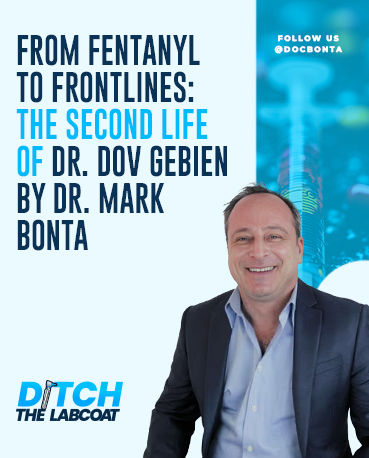Occasionally, you read a story that lodges itself in your mind, impossible to shake. That’s what happened to me when I first read Dr. Dov Gebien’s account in Toronto Life—a harrowing, vulnerable, and courageous piece titled “I had the perfect life. Then I got hooked on fentanyl.” In it, he lays bare the descent from respected emergency physician to inmate #126135B, and the improbable journey back.
I remember being struck not just by the tragedy, but by the humility. And then, years later, when I sat down to interview Dov for Ditch the Labcoat, I realized this wasn’t just a story of redemption. It was a masterclass in resilience.
Dov’s story isn’t merely about substance use or recovery. It’s about confronting the limits of what we think we know—about medicine, about addiction, about ourselves—and choosing to live differently.
The Collapse
Dov began his career like many of us: dedicated, driven, and idealistic. He worked the high-stress, high-stakes world of emergency medicine. But beneath the surface, things were unraveling. Chronic back pain led to multiple surgeries, and with it came prescriptions for opioids—Percocet at first, then fentanyl. And then came the crash.
The addiction took hold quietly but thoroughly. In the Toronto Life piece, he describes waking up in a jail cell, detoxing on a concrete floor, covered in vomit, wondering if this was it. “I didn’t feel like a doctor. I didn’t even feel like a person,” he wrote.
But somehow, that wasn’t the end. It was the beginning.
The Moment of Light
What Dov shared on the podcast, and what wasn’t fully apparent in that article, is that the first moment of light came early. It came the day he was removed from a shift by two hospital leaders who knew everything—and still didn’t turn their backs on him. They pulled him aside and said, “There’s still a place for you here.” It was a hint of hope, and he held onto it like a lifeline.
What followed was years of legal battles, jail time, and a grueling, prolonged climb through the regulatory gauntlet. The College of Physicians and Surgeons of Ontario didn’t make it easy—and Dov doesn’t think they should have. “They have to make sure I’m safe for the public,” he said. “And I want that too.”
The New Physician
When we talk about “the other side” of addiction, we often imagine a return to who someone used to be. But for Dov, that was never the goal. He didn’t want to go back. He wanted to become someone new. And he has.
He’s softer now. Slower to judge. A better listener. “Back in residency,” he admitted, “I was one of those doctors rolling my eyes at patients with addiction. Now, I challenge myself to insert compassion.”
That shift—both internal and outward-facing—is profound. In our conversation, Dov talked about how stigma is still deeply rooted in healthcare. He recalled being discharged by security during a spinal infection because of assumptions about his history. He knew the attending physician. He was a fellow colleague. It didn’t matter. “It was the worst treatment I’ve ever received. And it was from my own.”
The System
As Dov rightly points out, if he had taken time off for chemotherapy or a broken leg, colleagues would have rallied around him. But for mental health or substance use? There’s still a coldness—a presumption of moral failure rather than medical illness.
And yet, Dov now finds himself arguably among the most monitored and accountable physicians in the system. He undergoes random drug testing, sees an addiction specialist regularly, and participates in Caduceus groups with other healthcare professionals in recovery. “I’m actually safer for patients now than most doctors who haven’t been through this,” he joked, not inaccurately.
And while he acknowledges that many doors remain closed, he’s learned not to take it personally. “I wonder what happened to them,” he says, referring to colleagues who respond with silence. “What made them so callous?”
The Researcher
Perhaps the most remarkable twist in Dov’s story is what he’s doing now. He’s not back in the emergency department—by mutual agreement with the College, he works in lower-stress clinical environments—but he’s channeling his energy into groundbreaking research on Sudden Infant Death Syndrome (SIDS).
It started with a patient who described what sounded like diaphragm cramping that caused sudden, transient breath-holding in sleep. Dov dug into the literature—and didn’t stop. Today, he’s published multiple peer-reviewed papers, collaborated with global experts like Dr. Paul Goldwater, and is in early-stage conversations with SickKids, Harvard, and King’s College about exploring the hypothesis further.
The theory is elegant in its simplicity: could spontaneous cramping of the diaphragm—a muscle fatigue phenomenon—be at the root of some SIDS cases? The more he looked, the more risk factors aligned. And while nothing is proven yet, he’s offering grieving families something they haven’t had in decades: a plausible explanation.
The Message
Dov’s journey is one of the most powerful arguments I’ve encountered for why we must take addiction seriously—not just as a public health crisis, but as an individual human experience. His story is proof that people don’t just recover—they evolve.
If you’re struggling, or know someone who is, Dov’s advice is simple: Talk about it. Let it out. Even if the consequences are hard, silence is worse. “Secrets rot you from the inside,” he told me. “Saying it out loud was the beginning of getting better.”
The Future
When you listen to Dov speak now, you hear a man who’s grateful, grounded, and focused on the long game. He knows he’s lucky. He knows most people don’t get second chances—let alone platforms to tell their story or opportunities to publish new medical theories. But he also knows he’s earned it.
“I don’t want to forget,” he told me near the end of our conversation. “I want to keep telling this story so I remember what it took to get here.”
And we should remember too.
Thanks for reading. If you found this conversation powerful or know someone who might benefit from hearing it, please share the episode and this post. Dr. Dov Gebien’s story is a reminder that behind every tarnished credential or broken license is a human being—and sometimes, a remarkable second act.
Subscribe for more episodes where medicine meets meaning, and stories that don’t fit neatly into clinical boxes.

